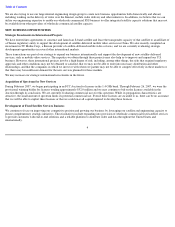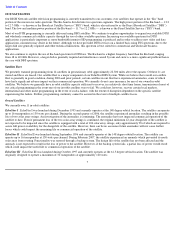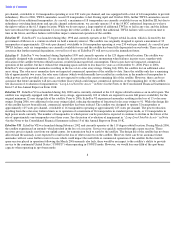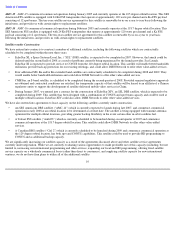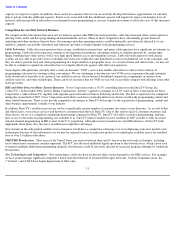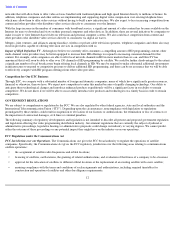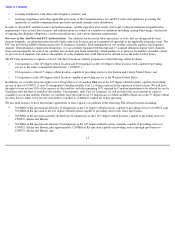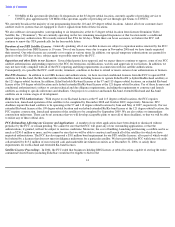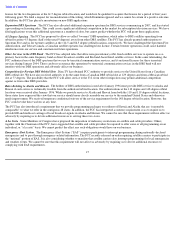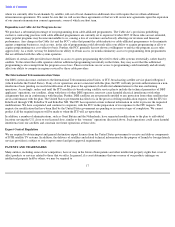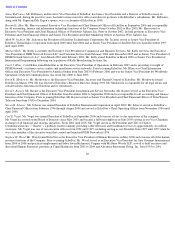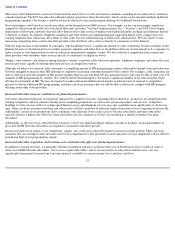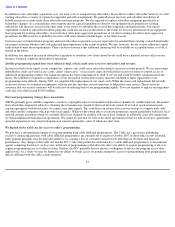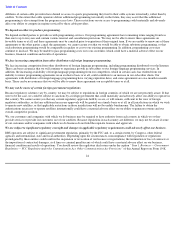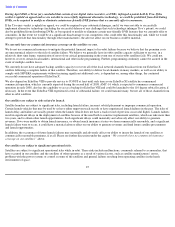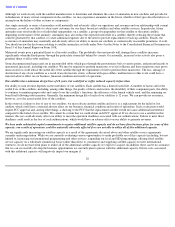Dish Network 2007 Annual Report Download - page 23
Download and view the complete annual report
Please find page 23 of the 2007 Dish Network annual report below. You can navigate through the pages in the report by either clicking on the pages listed below, or by using the keyword search tool below to find specific information within the annual report.
Table of Contents
Other Communications Act Provisions
Rules Relating to Broadcast Services
. The FCC imposes different rules for “subscription” and “broadcast” services. We believe that because
we offer a subscription programming service, we are not subject to many of the regulatory obligations imposed upon broadcast licensees.
However, we cannot be certain whether the FCC will find in the future that we must comply with regulatory obligations as a broadcast licensee,
and certain parties have requested that we be treated as a broadcaster. If the FCC determines that we are a broadcast licensee, it could require us
to comply with all regulatory obligations imposed upon broadcast licensees, which are generally subject to more burdensome regulation than
subscription television service providers.
Public Interest Requirements
. Under a requirement of the Cable Act, the FCC imposed public interest requirements on DBS licensees. These
rules require us to set aside four percent of our channel capacity exclusively for noncommercial programming for which we must charge
programmers below-cost rates and for which we may not impose additional charges on subscribers. This could displace programming for
which we could earn commercial rates and could adversely affect our financial results. The FCC has generally not reviewed all aspects of our
methodology for processing public interest carriage requests, computing the channel capacity we must set aside or determining the rates that we
charge public interest programmers. We cannot be sure that if the FCC were to review these methodologies it would find them in compliance
with the public interest requirements.
Plug and Play
. The FCC adopted the so-called “plug and play” standard for compatibility between digital television sets and cable systems.
That standard was developed through negotiations involving the cable and consumer electronics industries, but not us, and we are concerned
that it may impose certain onerous “encoding rules” on all multi-channel video programming distributors, including us, and that the standard
and its implementation process favor cable systems. We have filed a petition for review of the FCC’s “plug and play” order with the federal
Court of Appeals for the District of Columbia Circuit on various grounds, but we cannot be sure that the court will not uphold the FCC’s
decision.
Closed Captioning
. In 2005, the FCC initiated a rulemaking proceeding seeking comments on whether its rules that require broadcasters, DBS
providers and cable operators to transmit closed captioned content should be revised. We currently do not have the capability of captioning
every channel that we carry and rely on the program originators to perform this task. No technology exists that can be applied outside the
program originator’s facility to determine if a program is correctly captioned. If we are required to monitor every one of the thousands of
programs that we carry to ensure accurate captioning, we will bear substantial equipment, personnel and other related costs.
The Satellite Home Viewer Improvement Act and Satellite Home Viewer Extension and Reauthorization Act
Opposition to Delivery of Distant Signals . On October 20, 2006, a District Court in Florida entered a permanent nationwide injunction
prohibiting us from offering distant network channels to consumers effective December 1, 2006. Distant networks are ABC, NBC, CBS and
Fox network channels which originate outside the community where the consumer who wants to view them, lives. We have turned off all of
our distant network channels and are no longer in the distant network business. The ruling does not impact in any way our ability to provide
local channels by satellite, which we currently offer in over 170 markets, representing over 96% of all of U.S. television households.
Retransmission of Local Networks
. The Satellite Home Viewer Improvement Act, or SHVIA, generally gives satellite companies a statutory
copyright license to retransmit local broadcast channels by satellite back into the market from which they originated, subject to obtaining the
retransmission consent of the local network station. If we fail to reach retransmission consent agreements with broadcasters we cannot carry
their signals. This could have an adverse effect on our strategy to compete with cable and other satellite companies which provide local signals.
While we have been able to reach retransmission consent agreements with most local network stations in markets
16


